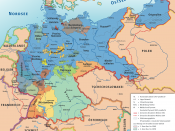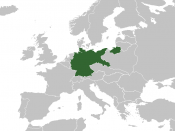Germany had lost the First World War and was to encounter many years of hardship in which she would have to endure a wide range of conflicts. A democratic government seemed to be the most logical choice (since Germany had very little experience with them ). This led to a constitution being made and agreed upon in the city of Weimar, thus resulting in the Weimar Republic. Obviously the entire population did not find this to be the most desirable solution to their troubles, but the constitution allowed these groups to form political parties in order to truly represent many of the peoples standpoints and wishes. There were also powerful ideas circulating through the European population in the forms of communism and fascism (not so much the latter until a few years later) during the infantile years of the parliamentary democracy which mused some of the political parties. Citizens adopted these ideas and created much tension within the crippled nation that would in turn just hinder the acceptance of a truly democratic government.
The Treaty of Versailles also imposed barriers and demands which would not only impede the economic growth of the Weimar Republic but also discourage people in trusting it. These are all factors which the democracy would have to deal with; nevertheless they can be regarded as obstacles and not definite catalysts. Even if they were hindrances statesmen that were willing to take risks in order to bring their country back into economic and international stability (even if it meant getting help from an Allied nation) while partially sacrificing their personal (or party's) agendas, were one of the reasons that proved the Weimar Republic's potential and showed that it was not doomed from it's foundation, as Alan James Edwards wrote "No one factor was responsible for the collapse...


